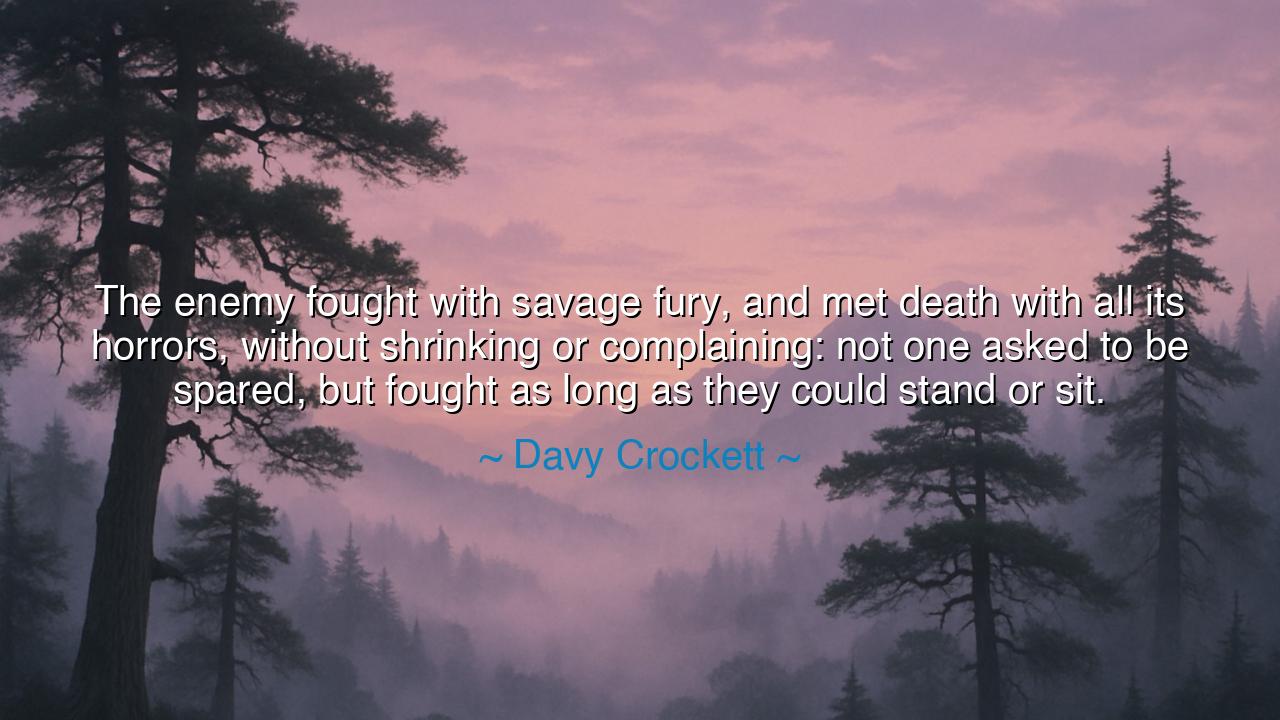
The enemy fought with savage fury, and met death with all its
The enemy fought with savage fury, and met death with all its horrors, without shrinking or complaining: not one asked to be spared, but fought as long as they could stand or sit.






“The enemy fought with savage fury, and met death with all its horrors, without shrinking or complaining: not one asked to be spared, but fought as long as they could stand or sit.” Thus wrote Davy Crockett, the frontiersman, soldier, and legend of the American wilderness — a man who had gazed upon both the beauty and brutality of battle. In this fierce and solemn sentence, Crockett bears witness to the indomitable courage of men in the face of annihilation. His words are not boast nor taunt, but reverence — the acknowledgment that even in one’s foes, there may dwell a heroic spirit, and that bravery, in its purest form, belongs to all who stand unflinching before death.
To understand his meaning, we must imagine the world as he knew it — a place where every frontier was carved through blood and wilderness, where the clash of men was as much about survival as about honor. In such a world, courage was the coin of existence, and those who met death without trembling were bound together, not as enemies, but as kindred souls in the ancient fellowship of warriors. When Crockett speaks of men fighting “as long as they could stand or sit,” he is describing the final measure of valor: to resist not for victory alone, but for dignity — to hold fast until the body itself betrays the will.
There is something deeply tragic and noble in his words. The “savage fury” he describes is not barbarism, but the elemental fire of life refusing to yield to death. It is the same fury seen in every creature that fights when cornered, but elevated in men by the weight of purpose and conscience. These warriors, though called enemies, became symbols of human defiance against the inevitable — death’s unrelenting shadow. Crockett’s awe before their resolve reflects an ancient wisdom: that valor transcends allegiance. The heart that fights bravely, even in error or defeat, commands respect from those who recognize in it the same mortal courage that beats within their own breast.
The echo of Crockett’s words reaches beyond his time, back to the ages of the ancients. When Hector faced Achilles before the walls of Troy, he too met death with “all its horrors” and without complaint. Knowing he could not prevail, he fought not to win, but to prove worthy of remembrance. So too did the Spartans at Thermopylae, whose stand against the Persian host became a hymn to defiance. These men, like the ones Crockett describes, sought not mercy, but meaning — to die as warriors, standing firm in the face of the infinite. It is in such deaths that mankind glimpses the terrible beauty of courage untainted by hope.
But Davy Crockett’s words also carry a shadow of warning. In his reverence for his foes, there is sorrow, for he had seen too much of death to glorify it blindly. To fight until one cannot stand or sit may be valor, but it is also the measure of humanity’s madness — the endless cycle of blood and vengeance that consumes both victor and vanquished. The “horrors of death” are not softened by courage; they remain horrors still. Yet it is perhaps this paradox — that men can be both noble and doomed — that moved him to write with such solemn admiration. He understood that to look upon courage in battle is to see both the best and worst of mankind in a single flame.
And yet, the lesson that rises from this quote is not despair, but reverence for endurance. Courage is not born in the moment of triumph, but in the instant when defeat is certain and the heart still chooses to stand. The warriors who fought “without shrinking or complaining” teach us that greatness lies not in avoiding suffering, but in facing it with dignity. Whether on the battlefield, in the struggle for justice, or within the quiet wars of our own hearts, the call is the same: to stand firm until we can stand no longer, and even then, to fight from where we sit — unbroken, unyielding, and unafraid.
Lesson: Let us not romanticize war, but let us honor courage — in enemies, in friends, and in ourselves. To live rightly is to fight with integrity, to face hardship without complaint, and to meet even the end with composure. When the trials of life rise against you, remember Crockett’s words: do not shrink, do not ask to be spared, but fight on until the last strength leaves you. For the measure of a life is not in how long it lasts, but in how fiercely it is lived, and how steadfastly it faces its final hour.
So remember the wisdom of Davy Crockett: that valor knows no allegiance, and that the true glory of mankind lies not in conquest, but in courage. The enemy, too, may die with honor; the defeated may still be noble. And in honoring their strength, we learn the deeper lesson — that death, when met without fear, transforms the mortal into the eternal, and the battlefield, however bloody, into a place of immortal remembrance.






AAdministratorAdministrator
Welcome, honored guests. Please leave a comment, we will respond soon